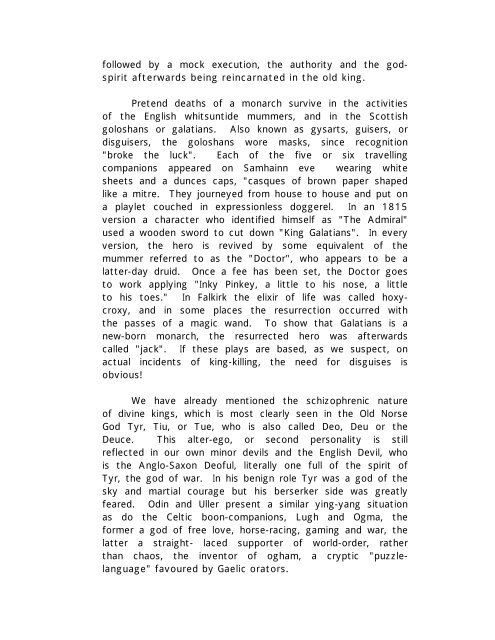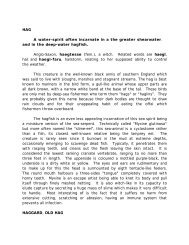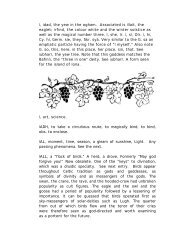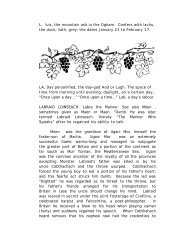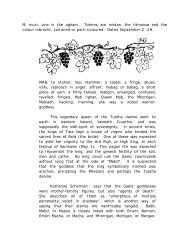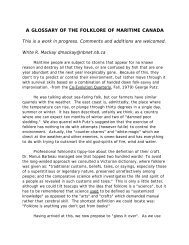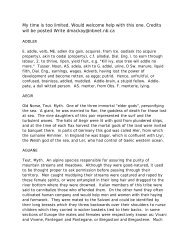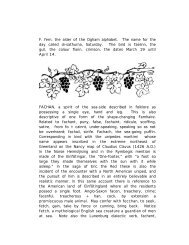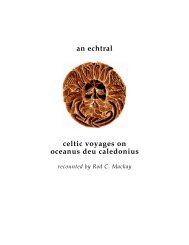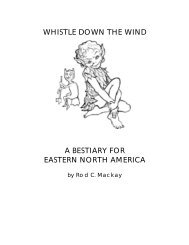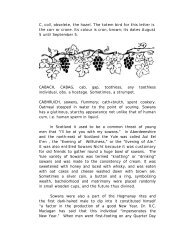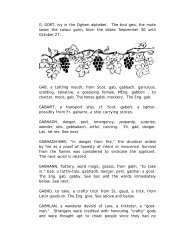R, ruis, the dwarf elder in Ogham. The rochat, or ... - Rodney Mackay
R, ruis, the dwarf elder in Ogham. The rochat, or ... - Rodney Mackay
R, ruis, the dwarf elder in Ogham. The rochat, or ... - Rodney Mackay
You also want an ePaper? Increase the reach of your titles
YUMPU automatically turns print PDFs into web optimized ePapers that Google loves.
followed by a mock execution, <strong>the</strong> auth<strong>or</strong>ity and <strong>the</strong> godspirit<br />
afterwards be<strong>in</strong>g re<strong>in</strong>carnated <strong>in</strong> <strong>the</strong> old k<strong>in</strong>g.<br />
Pretend deaths of a monarch survive <strong>in</strong> <strong>the</strong> activities<br />
of <strong>the</strong> English whitsuntide mummers, and <strong>in</strong> <strong>the</strong> Scottish<br />
goloshans <strong>or</strong> galatians. Also known as gysarts, guisers, <strong>or</strong><br />
disguisers, <strong>the</strong> goloshans w<strong>or</strong>e masks, s<strong>in</strong>ce recognition<br />
"broke <strong>the</strong> luck". Each of <strong>the</strong> five <strong>or</strong> six travell<strong>in</strong>g<br />
companions appeared on Samha<strong>in</strong>n eve wear<strong>in</strong>g white<br />
sheets and a dunces caps, "casques of brown paper shaped<br />
like a mitre. <strong>The</strong>y journeyed from house to house and put on<br />
a playlet couched <strong>in</strong> expressionless doggerel. In an 1815<br />
version a character who identified himself as "<strong>The</strong> Admiral"<br />
used a wooden sw<strong>or</strong>d to cut down "K<strong>in</strong>g Galatians". In every<br />
version, <strong>the</strong> hero is revived by some equivalent of <strong>the</strong><br />
mummer referred to as <strong>the</strong> "Doct<strong>or</strong>", who appears to be a<br />
latter-day druid. Once a fee has been set, <strong>the</strong> Doct<strong>or</strong> goes<br />
to w<strong>or</strong>k apply<strong>in</strong>g "Inky P<strong>in</strong>key, a little to his nose, a little<br />
to his toes." In Falkirk <strong>the</strong> elixir of life was called hoxycroxy,<br />
and <strong>in</strong> some places <strong>the</strong> resurrection occurred with<br />
<strong>the</strong> passes of a magic wand. To show that Galatians is a<br />
new-b<strong>or</strong>n monarch, <strong>the</strong> resurrected hero was afterwards<br />
called "jack". If <strong>the</strong>se plays are based, as we suspect, on<br />
actual <strong>in</strong>cidents of k<strong>in</strong>g-kill<strong>in</strong>g, <strong>the</strong> need f<strong>or</strong> disguises is<br />
obvious!<br />
We have already mentioned <strong>the</strong> schizophrenic nature<br />
of div<strong>in</strong>e k<strong>in</strong>gs, which is most clearly seen <strong>in</strong> <strong>the</strong> Old N<strong>or</strong>se<br />
God Tyr, Tiu, <strong>or</strong> Tue, who is also called Deo, Deu <strong>or</strong> <strong>the</strong><br />
Deuce. This alter-ego, <strong>or</strong> second personality is still<br />
reflected <strong>in</strong> our own m<strong>in</strong><strong>or</strong> devils and <strong>the</strong> English Devil, who<br />
is <strong>the</strong> Anglo-Saxon Deoful, literally one full of <strong>the</strong> spirit of<br />
Tyr, <strong>the</strong> god of war. In his benign role Tyr was a god of <strong>the</strong><br />
sky and martial courage but his berserker side was greatly<br />
feared. Od<strong>in</strong> and Uller present a similar y<strong>in</strong>g-yang situation<br />
as do <strong>the</strong> Celtic boon-companions, Lugh and Ogma, <strong>the</strong><br />
f<strong>or</strong>mer a god of free love, h<strong>or</strong>se-rac<strong>in</strong>g, gam<strong>in</strong>g and war, <strong>the</strong><br />
latter a straight- laced supp<strong>or</strong>ter of w<strong>or</strong>ld-<strong>or</strong>der, ra<strong>the</strong>r<br />
than chaos, <strong>the</strong> <strong>in</strong>vent<strong>or</strong> of ogham, a cryptic "puzzlelanguage"<br />
favoured by Gaelic <strong>or</strong>at<strong>or</strong>s.


